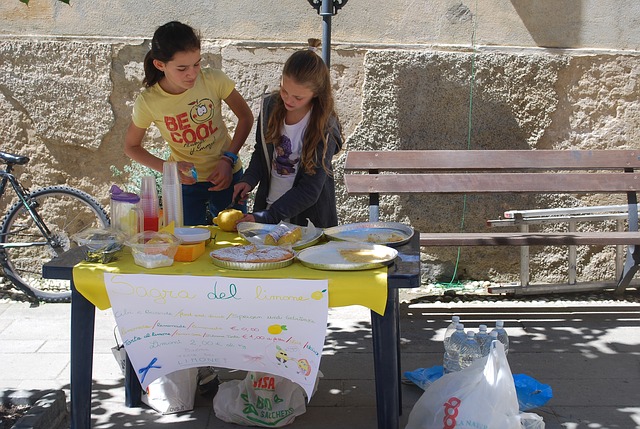Jasmine Birtles
Your money-making expert. Financial journalist, TV and radio personality.


Want to keep your kids entertained this summer without spending a penny? Help them get a summer job! Kids can make money in all sorts of ways. You’ll need to use your own judgement in assessing how mature your child is and how ready they are to take on the responsibility. Young children shouldn’t be working more than a few hours a week. But there are lots of ways even younger kids can make a bit of money.
There are all sorts of things children can do to make some extra pocket money, but the younger they are, the more help and supervision they will need from you. Here are some ideas to start with:

Here are just a few of the great jobs for kids to get you and your kids started:
Your child could run a juice/ice lolly stand, or perhaps organise a yard sale, or make cash selling all those old toys they no longer play with.
All you need to set up this type of job is a table and a pot of loose change. If you’re encouraging children to sell their old toys, then you could set this up in your front garden for passers-by to view. Or, organise a stall at a school, village fete, or local car boot sale. But if they’re thinking of making their own sweets or cakes to sell then they may need to borrow items from your kitchen. They might even buy napkins and plastic cups as well as ingredients.
The other advantage of running a ‘business’ like this is that it’s a good way to teach basic maths to your children. Sit down after their hard day’s work and count out how much money they made. Then deduct the money you spent on cups and ingredients to show them how much they really made. In one go you have a practical explanation of arithmetic and basic business principles.
There are lots of little jobs for children to do. If they’re a little older they can try tutoring or coaching other kids (teaching computers, maths, reading, how to play football). Other ideas are running errands for the elderly (reading the newspaper to them or running to the local shop to purchase a few supplies). This is an idea if any elderly neighbours have the spare cash to pay for jobs.
Coaching younger children is a great way of earning some extra money, and also teaching your child patience. If your child is learning an instrument, he or she could coach children who are at a lower grade then they are or help a younger child learn to ride a bike. If your child is lucky enough to be bi-lingual then encourage them to offer tutoring in foreign languages.
With these kinds of jobs it’s important to have references to show that the children are trustworthy. Letters from school teachers, vicars, your doctor or similar should be enough until they have references from people they have done work for.
Gift wrapping, walking, sitting and grooming pets, washing cars, mowing lawns, babysitting, delivering papers, window cleaning and even entertaining other kids by putting on plays and charging admission.
Kids can make loads of money as a dog walker. Adult dog walkers can charge as much as £15 a dog for a 45 minute walk (see our article on dog-walking for information on that). Children may want to pitch themselves lower at around the £5-£8 mark, but if people are willing to pay more then go for it. Obviously, this isn’t a job for children who are scared of dogs, as they’ll need to be in control of the animals they’re looking after. It’s probably also a good idea that your child only walk small or medium-sized dogs, especially if they’re not very tall or strong.
The best way to get business is by making flyers on a computer, and then pinning them to notice boards in local dog-friendly parks or online on a website like Gumtree. It’s also wise to buy your child an extra lead to carry with them, just in case the one the owner has provided them with breaks. Also, bring a few dog toys to play with in the park and a supply of plastic bags for dog mess.

It may be a good idea to make up flyers or business cards (they can get 250 FREE business cards and a card holder just by contacting Vistaprint). Go door to door and hand them out to neighbours and friends.
Have fun and let your child be creative when making up their flyers. The flyers should include:
You don’t need to spend much on making up flyers. Visit Poundland for some bargain pens and other stationery.
Advertising your child’s new venture on the internet is not a good option. It’s very difficult to monitor who is contacting your child. Stick to the old-fashioned way of advertising locally and letting the word spread.
A summer job is all about teaching kids the value of money and letting them feel a bit independent, however you do need to keep their safety in mind at all times.
If your child will be selling lemonade, juice, or frozen lollies you’ll need to buy the supplies for them.
You can buy a large carton of the stuff for less than £1. For an even better time, have your child make the juice. Look for recipes online; some ideas are sparkling tropic fruit juice, orange juice, and lemon and lime.
They can probably charge about £1 per drink, but you’ll have to cater to what customers are willing to pay. You may want to make sure your child is out there on hot days and maybe selling some warmer drinks on wet days.
If you have a coolbox at home, use that to store cold drinks or frozen lollies. If you need to buy one, they’re available at Tesco Direct at discount prices. Whilst you’re there grab some plastic cups and try to buy reusable ones – it will save you money and be more environmentally friendly.
As for their ‘stand’, just use any old table that you have lying around. If you need to buy one then buy a cheap one. Try Homebase where you can picnic tables from about £9.99.
If your child is going to be doing any cleaning or pet grooming, you’ll need to supply them with the pet shampoo or cleaning products.
Things like dog leashes, brushes, and toys for a dog walking job should be provided by the pet owner, as you may not want to share these items with several different pets. Treats for good behaviour is a nice thing to have on hand, but make sure that owners approve before your child starts feeding their pets treats.
For a cleaning job, there are some great home recipes for natural, eco-friendly cleaning supplies that you can make at home together very cheaply. Some really great recipes can be found at Organized Home. Also check out the MoneyMagpie guide to clean, safe and effective household cleaners.
When kids make money, it should be scheduled when you’re home so that you’re available if they need your help.
It’s best to have them selling from your home. Their lemonade stand should just be out in the garden. People will be attracted by their flyers, particularly if they’re out there on those really warm summer afternoons. Always keep your children supervised when they are out making money.
Have your children organise all the old toys they no longer play with, and any other things you may want to get rid of, and run a yard sale. Don’t buy anything new. Have your child make up posters that they hang around the neighbourhood informing people of the sale date.
You can have your child out there running the yard sale, but stay close. Adults may want to negotiate prices with you. To avoid loads of haggling it may be a good idea to have your child individually price all the items. Alternatively, you could set up a stall at a car boot sale or village fete and have your children run it if you don’t like the idea of a yard sale.
Again, make sure your child’s work hours are scheduled when you’re at home so that you’re available if they need your help. Especially the first few times your child is working, it’s a good idea to check their services are satisfactory.
You’ll want to send your child to provide a service (i.e. washing windows, cars, pet walking or grooming) with all the supplies they will need.
It’s up to you to decide whether you’re more comfortable with your child washing cars or grooming pets at your place, or at their client’s home. Obviously for services like window washing, or offering services like reading to the elderly, it will have to be done at the client’s house. Older children in their teens may be happy to do this unsupervised; always make sure you know where they’re going and how long they will be.
If they’re going to be tutoring other children, it’s best you supervise and ensure that your child is being patient and helpful.
Tutoring can be frustrating so stay close, but try not to interfere. It’s important your child builds their self-confidence and initiative.
If your child loves riding their bike around, why not have them deliver some papers while they’re at it? To get your child a paper route, contact your local newsagent.
Establish all prices for services and sales before any work is done. You’ll need to negotiate your prices with customers, but here’s guideline to what are fair prices:
Lemonade stand: £1 per drink
Washing cars: £5 per car
Mowing lawns: Anywhere from £5 to £20 (depending on size of lawn)
Groom pets: Between £5 and £7
Babysitting: £5 an hour, with overtime pay after midnight
Delivering papers: £5 per day to £20 a week.
Window cleaning: Between £3 and £5
Tutoring or coaching: £5 – £20 per hour.
Running errands for the elderly: Between £3 and £10 (depending on errands)
Walking pets: £3-£5 an hour
Pet sitting: Between £5 and £10 per visit
Gift wrapping: £3 a gift
Babysitting is probably the most popular way older kids make money. It’s a great way for them to earn and learn as long as they’re mature enough for the responsibility.
The NSPCC recommends children be 16 and over, however lots of 14-year-olds babysit. Use your judgement on whether your child is able to cope with it.
A great way to practice babysitting is with younger siblings, then moving on to friends’ and neighbours’ children. It’s not a good idea to have them start out with children or families that they don’t know.
The best way to find a paper round is to ask local newsagents if they have any vacancies. This is because it’s newsagents who organise delivery of papers, rather than the newspaper companies themselves. You could also call up or look on websites of local free magazines to see if they require delivery boys/girls. You can also try local councils and take-away shops to see if they need any leaflets distributing.
The wage you receive from being doing a paper round depends on how old you are and how many papers you deliver. Under 16s don’t have a minimum wage. You’re paid weekly, and it could be anything between £5-£20. Being a paper boy/girl isn’t a very difficult job, but it’s an all-weather job. Also remember that early starts are nearly always required.
If your child has, or is thinking about doing, a paper round, make sure they have a good quality water-proof coat for bad weather and a reflective jacket for early starts on dark mornings. A bike would also be a bonus, and will make the paper round a lot quicker and easier for your child. They’ll also need a sturdy backpack – try to avoid letting them use a cross-body messenger style bag, as it’ll get very heavy with the papers and could cause shoulder and back issues. With all that taken care of, this is an excellent way for kids to make money.
Children make lots of money doing jobs that nobody else really wants to do, and that includes washing the car. Encourage your child to gather a group of friends. Although this means less money as the profits will be split between everyone, extra pairs of hands means they can wash more cars and have more fun doing it. You may have to supply buckets, sponges, water and car shampoo/washing up liquid. Also bring a box to put the money in. These don’t have to be bought new especially for the occasion. Use old beach buckets for soapy water and ice cream tubs to keep money in.
It could be easiest if the kids make money with flyers first (easy to make on the computer) advertising a car wash event, rather than go door to door offering a car washing service. That way, people can come to you. If you want to do it this way, try and organise the event for an evening or weekend, otherwise if you plan it for daytime during the week, people will be at work and will probably have taken their cars with them.
Remember to find a suitable location for your car wash. Preferably not on grass, as the soil will not soak up all the water if you have a lot of cars to clean, and cause a flood. Concrete is probably the safest option, so use a driveway or empty street.

Employment rights for under 18s are very different from adult workers. Working hours, wages, tax and the type of work a child can do all vary depending on what age the working child is.
Under 13s cannot legally work. Though, they can take part in paid sport or entertainment with permission from your local authority.
13 is the youngest age that any child in the United Kingdom is allowed to undertake paid work. Before the age of 13 a child cannot legally be employed.
Once a child reaches the age of 13, they can do ‘light work’. This is work which is not likely to affect health, safety or education. This includes such jobs as shop work or taking on a paper round. This ‘light work’ restriction lasts until a child is 16.
It’s advisable that you check with the local authority where your place of work would be, to see what restrictions they have about the employment of 13-year-olds.
At 14, the rules become slightly more relaxed about where and when a child can and cannot work. Again, as with 13-year-olds, health is a big factor in working regulations. At 14 years old, the law only permits ‘light work’, and they cannot work in factories or on a building site.
Working hours also change when a child hits 14, and there are some very tight restrictions. The main ones are:
Until a child is 16, education takes priority over employment in a child’s life. The law doesn’t permit any work that interferes with school time. Always keep this in mind when looking for ways kids can make money!
The working rights of 15- and 16-year-olds are almost identical to those of 14-year-olds. However, there are a few changes:
In 2015, the school leaving age was raised to 18, but they don’t necessarily have to be in traditional education from the age of 16. They can be at college, doing an apprenticeship, or spending at least 20 hours a week working if they’re in part-time training or education.
Because the rules become more relaxed at this point, a part-time student might have enough time to start doing more work. You’re also not limited to just ‘light work’, so you’re allowed to work in places like a busy shop, restaurant kitchen or as a waiter or waitress.
As of April 2020, under 18s will earn at least £4.55 an hour.
Check out the government website for more info on school leaving age.

At 16 everybody starts paying National Insurance, but only if they earn over £166 a week. More about National Insurance can be found here.
If you’re a student, you still pay tax on your income unless all of the following apply:
You can ask an employer for form P38(S) (Student Employees), which means tax won’t be deducted from your earnings.
When your child starts making money, it’s a great time to teach them about financial literacy. Help them set up a bank account for their wages, and show them how they can start saving their money, too.
If you really want to make sure your child is getting ahead early in life, talk to them about setting up a pension. Yes, really! You can set up a pension for a child as soon as they’re born: even tiny contributions when they’re under-18 will make a MASSIVE difference to their financial future.
